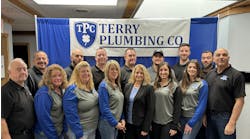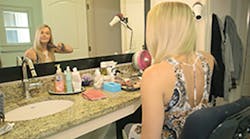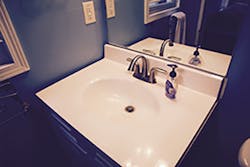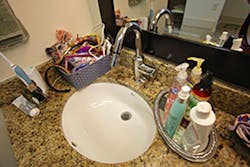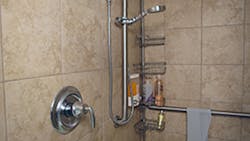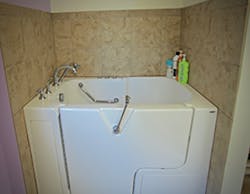Latest from Plumbing Contractor
Sponsored
American Standard Brands donates ADA-compliant bathroom fixtures for home renovation
ATLANTA — In 2012, adventurous, independent graduate student Aimee Copeland decided to celebrate finishing her school classes by vacationing with friends near the Little Tallapoosa River in Georgia. During the trip, Copeland fell in a river when a zip line snapped, suffering a deep cut in her leg, which caused her to contract a flesh-eating bacterial disease that spread throughout her body. During her struggle to survive, doctors were forced to amputate both of her legs and hands.
Copeland refused to let her new “normal” put limitations on her lifestyle. She recently graduated with her second master’s degree in social work and hopes to build a holistic center for people with disabilities. She also lives in her own, one-story home in a redeveloping area of downtown Atlanta. Copeland loved the home’s open space floor plan, but it required substantial modifications to make it more accessible for her needs.
Inspired by Copeland’s story, MRP Design Group, an architectural and engineering firm in Atlanta, provided their service and materials for the project. The firm also reached out to professional and personal connections. Notified of the project by manufacturer’s rep, Harry Warren Inc. of Georgia, American Standard Brands offered to donate $14,000 worth of specialty ADA-compliant bathroom fixtures for the renovation.
“We were all incredibly moved by Copeland’s story and inspired by her resolve,” said Tom Morgan, architect for MRP Design Group. “Every effort was made, by every contractor involved, to minimize costs and donate as much as possible, even though Copeland never once asked for anything free.”
The challenge lay in making Copeland’s home adaptive to her needs. The existing kitchen sink was not accessible, nor was her laundry area and pantry sufficient for her needs. Copeland wanted the freedom of a screened veranda and a deck that was large enough to enjoy with plenty of room for guest seating and open thresholds that did not create barriers. The front steps were not even accessible without a new ramp. The largest challenge was limited space in the 4 feet x 7 feet master bathroom, including the standard size tub, and her wheelchair was too wide to fit through the doorway. As a result, Copeland had to rely on constant assistance anytime she needed to use the bathroom — an embarrassing frustration for a self-sufficient woman. Therefore, the space needed to be expanded and reconfigured in order to provide wheelchair access. However, Copeland faced an obstacle before any work could even begin.
We attended several zoning board meetings with the city, but they kept denying our request for a variance, which was acceptable when the house was built. You would think, in an area that needs economic redevelopment, some logic might prevail,— Keith Hawkins
When her house was built in 1920, there were no regulations for the space between the property line and one’s home, and many were built two feet from the lot line. The original builder thought they were being gracious by putting the foundation almost four feet from the property. Unfortunately, modern regulations created a set-back of seven feet. As a result, in order to construct the planned 800-sq.ft. addition in line with her existing house, Copeland needed to apply for a variance to the current zoning code. Otherwise, the renovation would have to be reworked, adding excessive length and expense to make up for a re-configured width.
“We needed the set-back shortened to 3 1/2 feet for the expansion,” recalled the project’s general contractor, Keith Hawkins with Hawkins Construction in Waleska, Georgia. “We attended several zoning board meetings with the city, but they kept denying our request for a variance, which was acceptable when the house was built. You would think, in an area that needs economic redevelopment, some logic might prevail.”
Finally, after eight months, a lot of paperwork and with the support of every close neighbor, Hawkins said the higher levels of the city Zoning Board overruled initial objections and welcomed Copeland to the city.
Accessibility and safety
The transformation began in August 2015, when builders began excavating a foundation for the 800-sq.ft. bedroom expansion. Immediately, they ran into a serious problem.
“The biggest challenge for us was that the soil composition lacked sufficient support for the foundation,” recalled Hawkins, a 30-year construction veteran who specializes in mostly commercial projects. “We ended up having to remove four feet of the loose topsoil and add new fill to ensure the ground was firm enough for the expansion.”
Two weeks later, after rough framing was complete, workers began tiling and installation of granite, cabinetry and the ADA-compliant fixtures — the renovation and addition was complete. B.R. Loggins Plumbing of Jasper, Georgia, installed the plumbing fixtures.
A key addition to the new bathroom is a deep and spacious massaging walk-in bath, which offers many therapeutic benefits to Copeland, such as the built-in comfort seat.
This tub has made a huge impact on my life because it has enabled me to take therapeutic baths for my scar tissue and skin grafting. The tub overall has helped eliminate a lot of my pain, which means I can sit up longer and also more comfortably — especially in my car,— Aimee Copeland
The walk-in bath also features a large, watertight door that swings outward, providing more room when entering and exiting the tub and allowing for a safer wheelchair transfer for Copeland.
“Before the installation, I couldn’t even take a tub bath and would have to have assistance to get into the shower,” said Copeland. “This tub has made a huge impact on my life because it has enabled me to take therapeutic baths for my scar tissue and skin grafting. The tub overall has helped eliminate a lot of my pain, which means I can sit up longer and also more comfortably — especially in my car.”
Prior to the renovation, the deck of the bathroom sink was situated too low to allow wheelchair access. A new undermount sink with a pull-down faucet, originally intended for bar applications, provides the flexibility and functionality that Copeland needs.
“Before my accident, I would simply cup my hand with water to rinse my mouth out while brushing my teeth,” Copeland recalled. “The pull-down spray faucet with lever handle is easy for me to grip, which makes it easier for me to brush my teeth and rinse out my mouth.”
Copeland also needed a shower setup that would give her more bathing independence. Previously, she did not have a roll-in shower, which allows a wheelchair to maneuver all the way into the shower stall.
“To create Aimee’s roll-in shower, we had to recess the tile shower floor and get the proper pitch for drainage,” explained Hawkins. “Inside the shower, we included safety grab bars and a multi-functional hand shower that can be adjusted to different heights so both Aimee and her friends can use it.”
Copeland is thrilled with the new shower. “Being able to take a shower on my own without anyone’s help is an amazing feeling,” she said. “The lever handle is also perfect because now I can easily adjust the height for myself and my guests.”
Copeland’s modified bathroom represents merely one aspect of adapting to her “new normal.” Accommodating devices throughout her home — from a wall-mounted hair dryer to an adjustable cutting board — all help her live self-reliantly. Ultimately, though, these are all just tools that pale in comparison to the most adaptive element of Copeland’s new life — her unwavering, independent spirit.
Subcontractors involved with this project:
- ALS Septic Systems, Canton, Georgia
- B.R. Loggins Plumbing, Jasper, Georgia
- Blanton Landscaping, Canton, Georgia
- Brian Construction Group, Canton, Georgia
- Casteel Construction, Canton, Georgia
- Classic Wiring Inc., Dallas, Georgia
- Maintenance Unlimited Services LLC, Atlanta, Georgia

